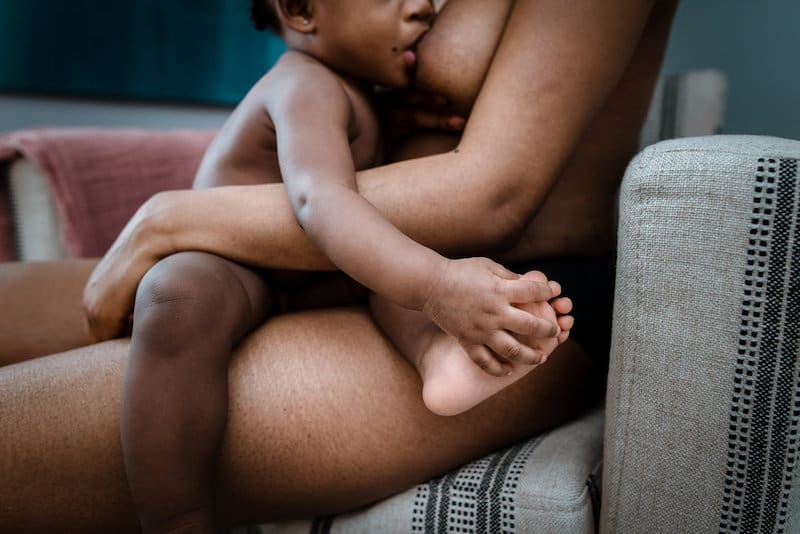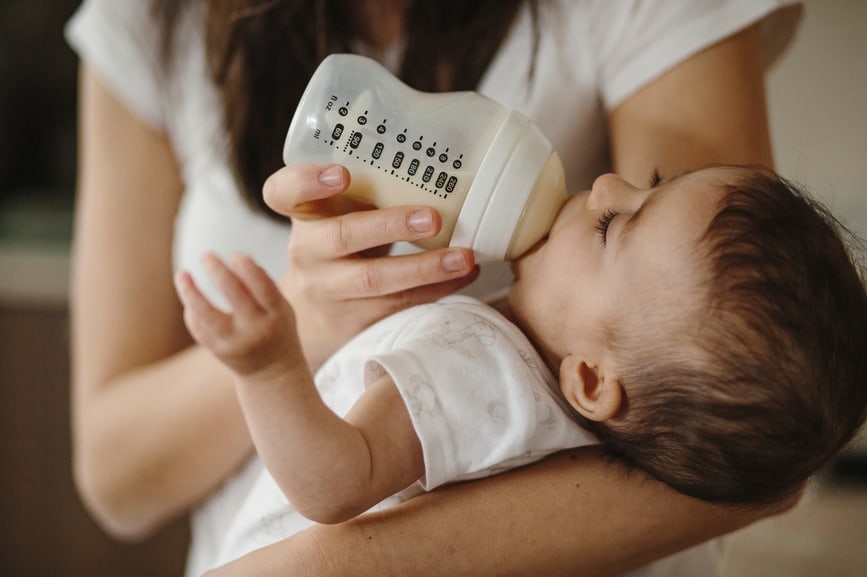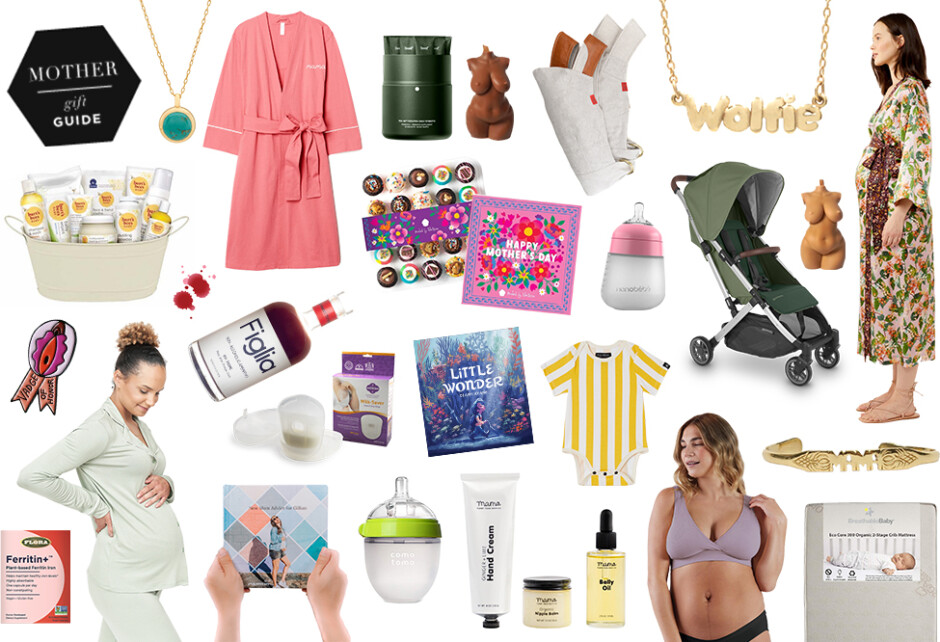
It’s Black Breastfeeding Week—Here’s Why It Matters
Written by
Photography by
Photography by Meredith Westin with Gather Birth Cooperative
Today marks the start of Black Breastfeeding Week 2019. Black Breastfeeding Week was launched over seven years ago by three amazing innovators and leaders in the field of maternal health: Kimberly Seals Allers, Kiddada Green, and Anayah Sangodele-Ayoka. Although national and international breastfeeding associations have been promoting breastfeeding-awareness campaigns in the month of August for over 20 years, Black Breastfeeding Week grew out of the need to highlight the particular challenges and triumphs of being black and breastfeeding.
Although there are many reasons to celebrate breastfeeding/chestfeeding and the wonders of human lactation in all its forms, the creators of Black Breastfeeding Week wanted to use this time—the last seven days of August—to bring awareness to disparities in breastfeeding rates among black women as compared with other groups.
According to Kimberly Sears Allers, Black Breastfeeding Week was created to bring awareness to these five areas affecting the black community around lactation.
The High Black Infant Mortality Rate
Black babies are dying at twice the rate (in some places, nearly triple the rate) of white babies. This is a fact. The high infant mortality rate among black infants is mostly due to their being disproportionately born too small, too sick, or too soon. These babies need the immunities and nutritional benefit of breast milk the most. According to the CDC, increased breastfeeding among black women could decrease infant mortality rates by as much as 50 percent.
High Rates of Diet-Related Disease
When you look at all the health conditions that breast milk—as the most complete “first food”—has been proven to reduce the risks of, African American children suffer from them in the highest numbers. From upper respiratory infections and Type II diabetes to asthma, Sudden Infant Death Syndrome, and childhood obesity—these issues are rampant in our communities. And breast milk is the best preventative medicine nature provides.
Lack of Diversity in the Lactation Field
Not only are there blatant racial disparities in breastfeeding rates, there are blatant disparities in breastfeeding leadership, as well. It is not debatable that breastfeeding advocacy is white-female led. This is a problem. For one, it unfortunately perpetuates the common misconception that black women don’t breastfeed. It also means that many of the lactation professionals, though well-intentioned, are not culturally competent, sensitive, or relevant enough to properly deal with African American moms. This is a week to discuss the lack of diversity among lactation consultants and to change our narrative. It’s a time to highlight, celebrate, and showcase the breastfeeding champions in our community who are often invisible. And to make sure that breastfeeding leadership also reflects the same parity we seek among women who breastfeed.
Unique Cultural Barriers Among Black Women
While many of the “booby traps” around breastfeeding are universal, black women also have unique cultural barriers and a complex history connected to breastfeeding. From our role as wet nurses in slavery, forced to breastfeed and nurture our slave owners’ children, often to the detriment of our children, to the lack of mainstream role models and multi-generational support, to our own stereotyping within our community—we have a different dialogue around breastfeeding and it needs special attention.
Desert-Like Conditions in Our Communities
Many African American communities are “first-food deserts”—it’s a term I coined to describe the desert-like conditions in many urban areas I visited where women cannot access support for the best first food—breast milk. It is not fair to ask women, any women, to breastfeed when they live in a community that is devoid of support. It is a set up for failure.
As we look at disparities, the picture can seem bleak. However, BBW brings visibility and conversation to not just the struggles, but also the joys, triumphs, and beauty of black breastfeeding. Black Breastfeeding Week celebrations have continued to grow every year, with a plethora of events and celebrations around the country. This years theme, “The World is Yours, Imagine, Innovate, Liberate!” has an uplifting vibe that truly matches the gatherings that have been happening already. Numerous organizations, health centers, and businesses have created unique events that have been spaces of education, awareness, support, and acknowledgement. This year also marks the debut of Chocolate Milk, a powerful documentary by filmmaker Elizabeth Bayne (her years-in-the-making passion project). Screening of the new film have been a part of more than 200 Black Breastfeeding celebrations this month!
Lactation Specialist Lydia O. Boyd, who is featured in the documentary, says this about Black Breastfeeding Week, ”Black Breastfeeding Week is a time where black families are centered and become the focus within the lactation world. We examine ourselves as professionals and the work that we do to see where we can improve. We provide time and space to black families to tell us what they need from us as they are birthing and feeding their babies. This year, with the screening of Chocolate Milk: The Documentary created by Elizabeth Bayne, we have been able to combine families and professionals on film to delve deeper into these conversations. I’ve attended three screenings and will attend two more before the end of August. Mothers get a glimpse into the background of the lactation professional. Communities journey with mothers who are on their breastfeeding journey. These events have answered questions and brought healing to our amazing and resilient community. Black Breastfeeding Week is a great facilitator of these conversations and has done an amazing job since its birth.”
How and Where to Celebrate Black Breastfeeding Week 2019:
When: Wednesday, August 28, 2–3 p.m. PST
Where: Instagram Live @momsincolor
What: This Instagram Live event will feature Kimberly Durdin and the wonderful Brandi Jackson (a.k.a. @bstereo). You can join wherever you are in the world and celebrate Black Breastfeeding Week!
When: Monday, August 26 through Saturday, August 31
Where: Orlando, FL, Sacramento, CA, Baltimore, MD, Wilmington, NC, Pittsburg, PA, Atlanta, GA, Compton, CA, and Fresno, CA.
What: Community screenings of Chocolate Milk: The Documentary. Check out more details here.
When: Saturday, August 31
Where:Kindred Space LA, Birth, Lactation & Education Space, 6820 La Tijera Boulevard, #202, Los Angeles
What: The founders of Kindred Space L.A.—Kimberly Durdin, IBCLC, Student Midwife, Childbirth Educator, and Doula; and Allegra Hill, CPM, LM, IBCLC—will be hosting a Black Breastfeeding Week Celebration with a screening of Chocolate Milk: The Documentary and a Q&A with Lydia Boyd.
Find an event near you at BlackBreastFeedingWeek.org
Kimberly Durdin is a Los Angeles–based Lactation Consultant (IBCLC), Student Midwife, Childbirth Educator and Doula. As a mother of six and grandmother of three, Kimberly credits her children as her greatest teachers. Over the last 26 years, Kimberly has interwoven her life with the lives of thousands of families throughout New York City, the Washington DC metro area, and Los Angeles. Be it through her work of providing lactation care, postpartum support, groups, counseling, childbirth education, labor support, or through her work mentoring current and future birth-workers, her dedication has allowed her to fully enjoy the fruits of her labor in the faces of the communities served. In March 2018, Kimberly and business partner Allegra Hill, LM, CPM, IBCLC, opened Kindred Space LA, a birth, lactation, and education space. Kindred Space LA is also home to the Birthing People Foundation, a non-profit they co-founded to train more birth workers of color. You can follow Kimberly and Kindred Space LA on Instagram.
Share this story




